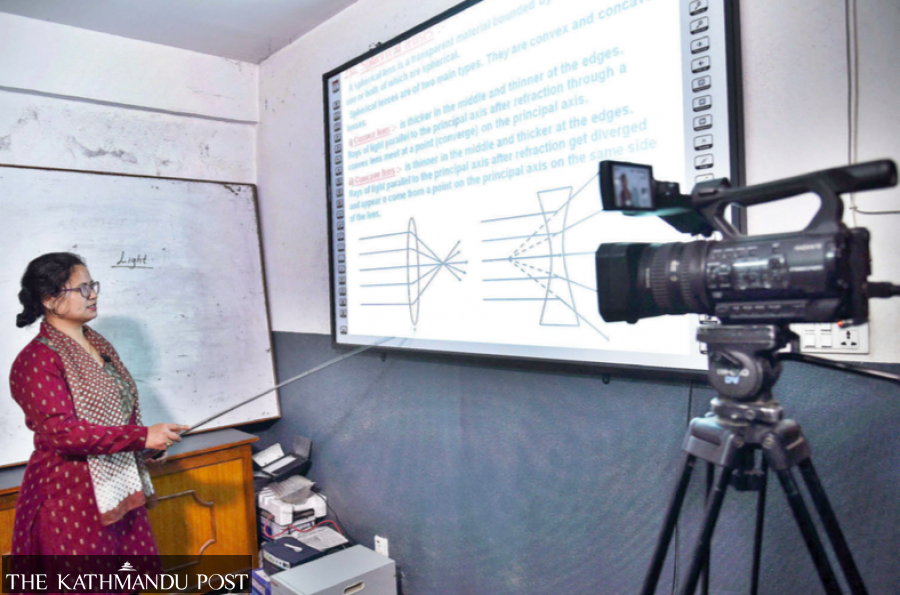National
Large number of children deprived of virtual learning, UNICEF survey shows
For 63 percent of children, textbooks are the only source of information.
Binod Ghimire
Despite tall claims by the government to have increased students’ access to virtual learning platforms, an overwhelming number of students still remain deprived of virtual learning opportunities.
A survey carried out by UNICEF among 6,643 children and guardians across the seven provinces shows textbooks are the only source of information for 63 percent of children ever since the country went into a lockdown in March last year to stem the spread of Covid-19. The number is higher in public schools with 70.5 percent of students relying solely on the textbooks while it is 61. 5 percent for the private schools. The report showed only 27 percent students have access to online classes — 18 percent at community schools and 43.5 percent at private schools.
“With substantial investments to increase households being connected to the internet, this alternative modality will continue to drive disparities in learning outcomes due to the existing digital divide,” reads the report made public on Friday. A similar UNICEF report released in August last year had shown a similar picture suggesting that there hasn’t been progress in improving children’s access to virtual learning.
The report last year had revealed that more than two-thirds of students were deprived of virtual learning. The study reveals that half of the children across the country haven’t had any in-person or virtual contact with their teachers since the schools were closed. The share of such students was 36 percent in private schools while 56 percent of students didn’t have any contact with their teachers. In terms of compensating for the losses in learning, 69 percent of the respondents complained that schools had not undertaken any efforts to support children to make up for the lost teaching-learning activities.
The ineffectiveness of virtual learning and the reluctance of schools and teachers to support their students has resulted in an overwhelming number of parents and guardians willing to send their wards to schools whenever the schools reopen, despite the risk of the coronavirus. As per the report, 89 percent of parents and guardians said they were willing to send their children to schools though only 34 percent were confident that their children’s schools would undertake all the required precautions to ensure a safe learning environment in line with safety protocols prescribed by the government. “It seems the parents and guardians are more concerned about the study of their children above all,” said Dipu Shakya, an education expert with UNICEF.
The schools are required to enforce standard safety measures for students and teachers, such as social distancing, wearing of mask, measuring temperature upon entering school and setting up handwashing stations and sanitisers on the school premises in addition to reducing the class sizes by introducing a shift system, undertaking periodic cleaning and establishing medical or isolation rooms and counselling facilities, as per the school reopening guidelines issued by the government. However, during the survey a majority of the guardian and students from the schools that have resumed in-person classes said the government’s protocols were flouted to the extent that 14 percent even don’t wear masks.
“Various studies by UNICEF show a large number of children are unable to continue their learning at the appropriate levels while children in substantial numbers are expected to be not learning at all,” said Shakya. “This will further deteriorate the learning achievements of the students whose academic performance is already poor.” Different studies including the one by the Education Review Office, under the Ministry of Education, show the learning achievement of school students, on an average, is less than 50 percent from the primary to the secondary level.
Government officials, while accepting that virtual learning hasn’t been as effective as it should have been, however refuse to accept that the penetration of this learning approach hasn’t increased compared to last year. “I don’t want to comment on UNICEF’s finding, but I believe there has been significant progress,” Keshab Dahal, spokesperson at the Centre of Education and Human Resource Development under the Education Ministry, told the Post. “We too are collecting the data on this. We will present the real picture once we collect the information from all schools.” The centre, however, this week unveiled a set of home-schooling guidelines that it claims will make the teaching-learning process more effective.
The centre has developed the guidelines with a vision to assign the elders and educated members of the family to teach the children at home. Home schooling will be applicable in places where resumption of face-to-face learning is not possible. “Home-schooling will prove beneficial not just during the Covid-19 pandemic but also during other disasters,” read the guidelines.




 13.12°C Kathmandu
13.12°C Kathmandu














